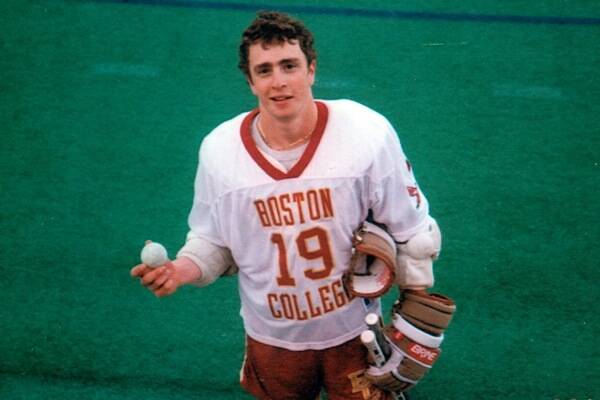At a Barnes & Nobles just blocks away from the World Trade Center, Tom Rinaldi, an ESPN reporter and author of the new book The Red Bandanna, stepped up to podium last Thursday to pose a simple but penetrating question.
What would you do in the last hour of your life?
Against our primal instinct of self-preservation, a young man named Welles Crowther demonstrated his answer on Sept. 11, 2001.
Give it away, he professed.
The story of The Red Bandanna begins on a Sunday morning before church when Welles was a young boy. His father handed him a red handkerchief, one he would keep for the rest of his life as a reminder of their loving relationship. Upon graduating from Boston College, Welles worked as an equities trader on the 104th floor of the South Tower of the World Trade Center. But he had always wanted to be a firefighter. And on that clear September morning 15 years ago, Welles used the red bandanna to cover his nose and mouth as he saved the lives of at least a dozen civilians from the collapsing structure. In doing so, he also lost his own.
What would you do in the last hour of your life?
In his last hour, Welles sacrificed his life to save others. But Welles’s act was not only a reflection of tremendous selflessness and courage but of a lifetime of experience and smaller decisions that shaped him for that moment.
If I could ask Welles one question, it would be this: What were those experiences that led to your decision to sacrifice yourself for others?
Perhaps it was because Welles felt he was truly beloved. He looked up to his father immensely and always kept the bandanna in his pocket to honor the special connection they shared. At the Barnes & Nobles event, Welles’s father, Jefferson Welles, described his son as “a man who could light up a room, and you could see it from the house next door.”
As a recent graduate from Boston College, a school rooted in the Jesuit tradition, I can see how Welles learned to become, as they say in Chestnut Hill, “a man for and with others.” Although he likely had a natural inclination for service, his personal and vocational formation at Boston College perhaps helped to deepen and develop his mature sense of selflessness.
During his time at Boston College, Welles also had a number of close friends from a range of different backgrounds, such as his buddies on the lacrosse team, companions from his studies abroad in Spain and those he ended up living with during his senior year. I can attest that the bonds formed at Boston College are truly special. The camaraderie that permeated Welles’s friendships at B.C. perhaps fueled his deep appreciation and willingness to sacrifice for “the other.”
During my junior year in 2014, I watched from the student section the wild Boston College upset win over the University of Southern California in the first annual Red Bandanna Football Game held in honor of Welles. Although it was the first time Boston College had beaten a top 10 opponent since 2002, the most electrifying moment in the game came when the Crowther family stood at midfield to the loudest applause that I have ever heard in Chestnut Hill. For me, the electricity in the air was not just the commemoration of a life lost but a witness to everlasting life.
One of the most frequently attributed statements to Jesus Christ shows up nine times in the Synoptic Gospels. It reads, “For whoever wishes to save his life shall lose it; but whoever loses his life for my sake shall find it.”
Welles Crowther knew these words, and he lived them.
Although we will never know what inspired Welles to give his life away, I believe the love he received from his friends and family, as well as with values instilled in him by his Jesuit education, had something to do with it.
Welles gave his life away to receive more of it.
Nick Genovese is an O'Hare Fellow at America.








